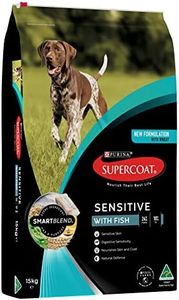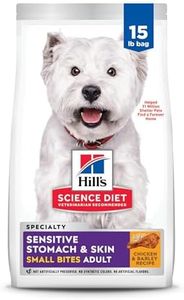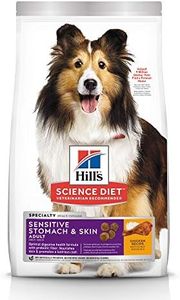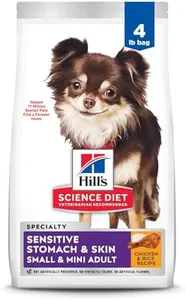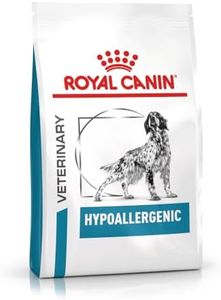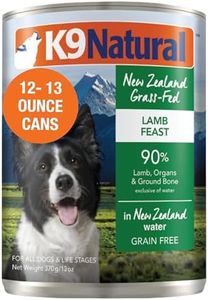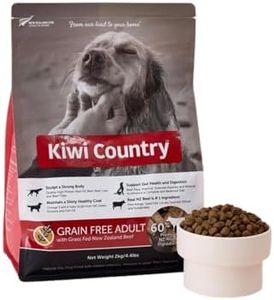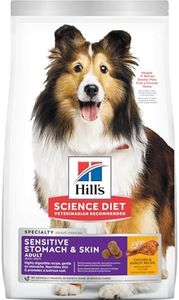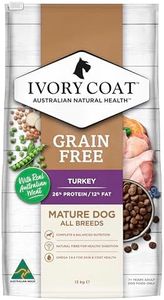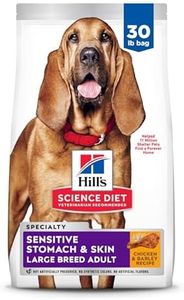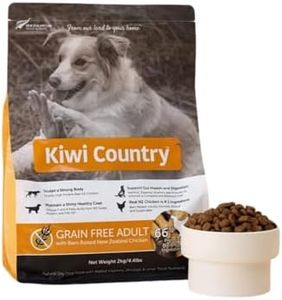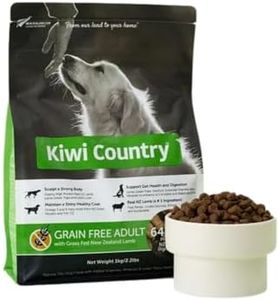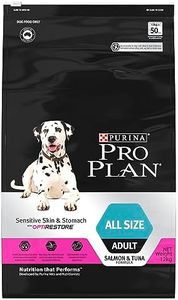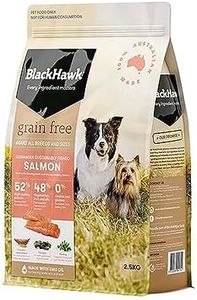We Use CookiesWe use cookies to enhance the security, performance,
functionality and for analytical and promotional activities. By continuing to browse this site you
are agreeing to our privacy policy
10 Best Sensitive Dog Food
From leading brands and best sellers available on the web.Buying Guide for the Best Sensitive Dog Food
Choosing the right sensitive dog food is important for the overall health and comfort of your dog, especially if they experience digestive issues, allergies, or skin problems. Since there are many causes for sensitivity, from specific ingredients to how the food is processed, it’s crucial to know what to look for in the ingredients list, the formula, and the type of food. Looking beyond marketing claims, you should focus on matching the food’s characteristics with your dog's specific needs so you can help manage their sensitivities or allergies more effectively.Protein SourceThe protein source in dog food refers to the main ingredient supplying proteins, such as chicken, beef, lamb, fish, or more novel proteins like duck or venison. This is important because some dogs develop sensitivities to common proteins, resulting in issues like itching or digestive upset. Protein sources generally fall into more common proteins (like chicken and beef), and novel or single-source proteins (such as duck, salmon, or lamb). If your dog has a known protein allergy, go for a food with a novel or single-source protein as these are less likely to trigger a reaction. If you don’t know yet, simpler recipes with fewer proteins are a safer choice to help identify any issues.
Grain-Free vs. Limited IngredientDog foods may be grain-inclusive, grain-free, or labeled as 'limited ingredient'. This is about how many and what kinds of carbohydrates and other ingredients are used. Grain-free foods swap out grains for potatoes, peas, or lentils, helpful for dogs with grain sensitivities but not always necessary for every sensitive dog. Limited ingredient diets have fewer total components, which makes it easier to avoid and identify potential allergens. If your dog has sensitivities or allergies, look for limited ingredient diets as they reduce exposure to possible triggers. Be aware, though, that true grain allergies in dogs are rare, so you might only need to switch to grain-free if your vet recommends it based on your dog's reactions.
DigestibilityDigestibility means how easily a food can be broken down and absorbed by your dog’s digestive system. High digestibility reduces the risk of stomach upset and may help with chronic diarrhea or poor stool quality. Foods rated as 'highly digestible' often contain easily processed ingredients and fewer artificial additives. If your dog often has loose stools, gas, or tummy problems, choose foods marketed as 'highly digestible' or those recommended for sensitive stomachs to help ease their discomfort.
Added SupplementsMany sensitive dog foods add supplements such as omega-3 fatty acids, prebiotics, probiotics, or vitamins. These can help with skin health, coat quality, or overall digestive function. The importance depends on your dog's symptoms; for example, if your dog has flaky skin or sheds a lot, foods with more omega-3 and omega-6 may help. Dogs with digestive issues may benefit from foods including prebiotics or probiotics to support gut health. Identify your dog’s main sensitivity concern and select a food with the matching supplemental support.
Artificial AdditivesArtificial additives include colors, flavors, and preservatives, which can sometimes irritate sensitive dogs or contribute to allergies. Sensitive dog foods may avoid or limit these entirely. If your dog reacts to many foods or you want the most natural diet possible, look for options labeled as free from artificial additives. Dogs with very sensitive systems should generally eat food as free from artificial extras as possible.
